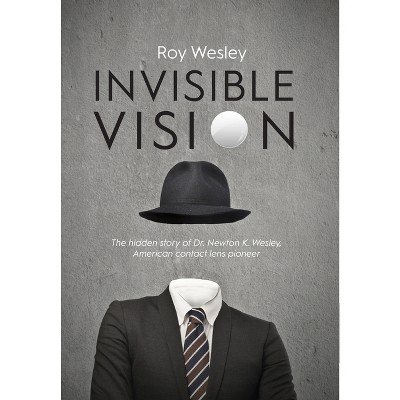Sponsored

Invisible Victims - by Frederic Lynch (Paperback)
In Stock
Sponsored
About this item
Highlights
- Lynch condemns the sloppy, fearful thinking that has converted affirmative action into quotas and that has kept social researchers shying away from this explosive topic.
- About the Author: FREDERICK R. LYNCH is Senior Research Associate at the Salvatori Center, Claremont McKenna College.
- 256 Pages
- Social Science, Discrimination & Race Relations
Description
About the Book
Lynch condemns the sloppy, fearful thinking that has converted affirmative action into quotas and that has kept social researchers shying away from this explosive topic.
Shulamit Reinharz Choice
There is nothing quite like Frederick Lynch's book which describes how affirmative action works in real life, and points to some very disturbing effects. This is a subject that should be discussed not only in the Supreme Court and Lynch makes an important contribution to that discussion. Nathan Glazer, Harvard University
More and more questions have surfaced in the past decade concerning the wisdom and fairness of affirmative action programs. In this book, Lynch takes a hard look at affirmative action policy development and the social and ethical implications of a system that promotes gender and race as criteria for vocational advancement and educational opportunity. He focuses on the experiences of white males who have been victims of reverse discrimination under such programs and explores the lackluster response from government, the media, and employing institutions. Lynch examines the political taboo that for two decades effectively stifled discussion of the issues that affirmative action raises in both public discourse and scholarly analysis. He reviews the original ideals and purposes of affirmative action and contrasts them with the program as it has actually operated in everyday work settings. In case studies based on interviews and other data, Lynch assesses the reactions of white males to affirmative action social barriers, as well as their impact on co-workers, friends, and relatives. He describes the role of the mass media, the social sciences, and ideological elites in creating a conspiracy of silence concerning the hidden and unintended consequences of affirmative action policies. The only study that deals specifically with the impact of affirmative action on white males, this book is a must read for anyone who is truly interested in understanding the sociological, political, and psychological complexities of this issue.
Book Synopsis
Lynch condemns the sloppy, fearful thinking that has converted affirmative action into quotas and that has kept social researchers shying away from this explosive topic.
Shulamit Reinharz Choice
From the Back Cover
The use of race-and-gender preferences to restructure American society has produced a good deal of conflict, resentment, and other problems. These problems, in turn, have generated a growing sense of crisis and doubt about affirmative action.Review Quotes
"A well-documented, ground-breaking, courageous book."- Warren Farrell, Ph.D. Author of Why Men Are the Way They Are
"Anyone seriously interested in race relations and sex roles in the United States must read this book."- William Beer Social Forces
"In making highly visible the invisible victims, Lynch succeeds brilliantly in lighting up the Byzantine recesses of the federal bureaucracy. A good subtitle would be: How the old inequality has been replaced by the new inequality."- Robert Nisbet Albert Schweitzer Professor, Emeritus Columbia University
"Lynch condemns the sloppy, fearful thinking that has converted affirmative action into quotas and that has kept social researchers shying away from this explosive topic."- Shulamit Reinharz Choice
"There is nothing quite like Frederick Lynch's book which describes how affirmative action works in real life, and points to some very disturbing effects. This is a subject that should be discussed not only in the Supreme Court and Lynch makes an important contribution to that discussion."-Nathan Glazer Professor of Education and Sociology Harvard University
"This excellent book is about real rather than potential victims, those who have suffered directly because racial preferences have disrupted or ended their careers. It is quite right to term them invisible....They are ordinary citizens, done in by their betters, swept aside coolly yet self-righteously in the service of a regnant cliche of the moment."- Joseph Adelson Professor of Sociology University of Michigan
.,."Invisible Victims belongs in the library of everyone concerned about the impact of affirmative action on American society. It should be read by Federal bureaucrats, university administrators, and media moguls. Despite the left's belligerent denials, the suspicion is unavoidable that runaway preferential treatment is a major cause of racial unrest on college campuses and elsewhere. Young white males, after all, in general have committed no offenses against blacks and women, and realize instinctively that justice is not being served when they are routinely sacrificed in the name of ill-defined social goals instead of treated as individuals and judged on their own merits. Lynch's research suggests a growing body of 'underground' resentment against affirmative action, and I predict a real donnybrook somewhere down the road if the problems it has created are not faces."-The Freeman
?...Invisible Victims belongs in the library of everyone concerned about the impact of affirmative action on American society. It should be read by Federal bureaucrats, university administrators, and media moguls. Despite the left's belligerent denials, the suspicion is unavoidable that runaway preferential treatment is a major cause of racial unrest on college campuses and elsewhere. Young white males, after all, in general have committed no offenses against blacks and women, and realize instinctively that justice is not being served when they are routinely sacrificed in the name of ill-defined social goals instead of treated as individuals and judged on their own merits. Lynch's research suggests a growing body of 'underground' resentment against affirmative action, and I predict a real donnybrook somewhere down the road if the problems it has created are not faces.?-The Freeman
?In the wake of the Los Angeles looting there will be calls for more "affirmative action" in hiring. Sociologist Frederick Lynch reminds us that affirmative action creates losers as well as winners.?-Forbes
"In the wake of the Los Angeles looting there will be calls for more "affirmative action" in hiring. Sociologist Frederick Lynch reminds us that affirmative action creates losers as well as winners."-Forbes
..."Invisible Victims belongs in the library of everyone concerned about the impact of affirmative action on American society. It should be read by Federal bureaucrats, university administrators, and media moguls. Despite the left's belligerent denials, the suspicion is unavoidable that runaway preferential treatment is a major cause of racial unrest on college campuses and elsewhere. Young white males, after all, in general have committed no offenses against blacks and women, and realize instinctively that justice is not being served when they are routinely sacrificed in the name of ill-defined social goals instead of treated as individuals and judged on their own merits. Lynch's research suggests a growing body of 'underground' resentment against affirmative action, and I predict a real donnybrook somewhere down the road if the problems it has created are not faces."-The Freeman
About the Author
FREDERICK R. LYNCH is Senior Research Associate at the Salvatori Center, Claremont McKenna College. He is the author of numerous articles on affirmative action and other social issues in scholarly journals and popular publications.Shipping details
Return details
Frequently bought together
Trending Non-Fiction

















